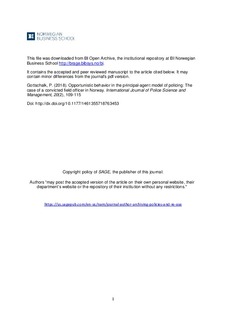| dc.contributor.author | Gottschalk, Petter | |
| dc.date.accessioned | 2018-06-25T07:53:25Z | |
| dc.date.available | 2018-06-25T07:53:25Z | |
| dc.date.created | 2018-03-22T08:08:23Z | |
| dc.date.issued | 2018 | |
| dc.identifier.citation | International Journal of Police Science and Management. 2018, 20 (2), 109-115. | nb_NO |
| dc.identifier.issn | 1461-3557 | |
| dc.identifier.issn | 1478-1603 | |
| dc.identifier.uri | http://hdl.handle.net/11250/2502749 | |
| dc.description.abstract | Whereas the criminal justice system is designed to determine whether a police officer as an offender is guilty or innocent, the principal–agent model of policing can provide insights into police officer behavior in law enforcement. Agency theory suggests that the chief as a principal and the field officer as an agent may have different preferences, varying knowledge, and opposite risk willingness when it comes to policing. For example, goals may justify means. In this article, the case of a convicted police officer in Norway is discussed based on principal–agent theory. | nb_NO |
| dc.language.iso | eng | nb_NO |
| dc.publisher | Sage | nb_NO |
| dc.title | Opportunistic behavior in the principal-agent model of policing: The case of a convicted field officer in Norway | nb_NO |
| dc.title.alternative | Opportunistic behavior in the principal-agent model of policing: The case of a convicted field officer in Norway | nb_NO |
| dc.type | Journal article | nb_NO |
| dc.type | Peer reviewed | nb_NO |
| dc.description.version | acceptedVersion | nb_NO |
| dc.source.pagenumber | 109-115 | nb_NO |
| dc.source.volume | 20 | nb_NO |
| dc.source.journal | International Journal of Police Science and Management | nb_NO |
| dc.source.issue | 2 | nb_NO |
| dc.identifier.doi | http://dx.doi.org/10.1177/1461355718763453 | |
| dc.identifier.cristin | 1574815 | |
| dc.description.localcode | 1, Forfatterversjon | nb_NO |
| cristin.unitcode | 158,4,0,0 | |
| cristin.unitname | Institutt for ledelse og organisasjon | |
| cristin.ispublished | true | |
| cristin.fulltext | postprint | |
| cristin.qualitycode | 1 | |
